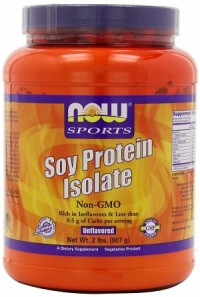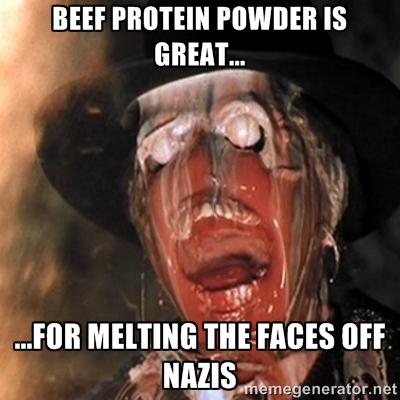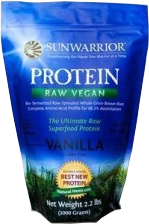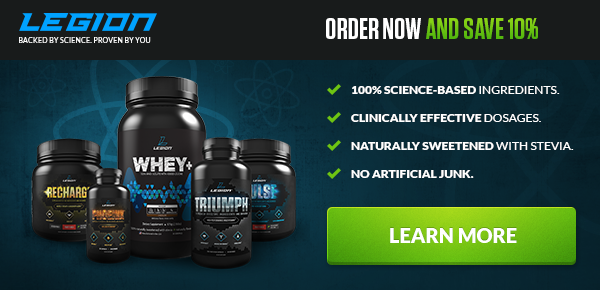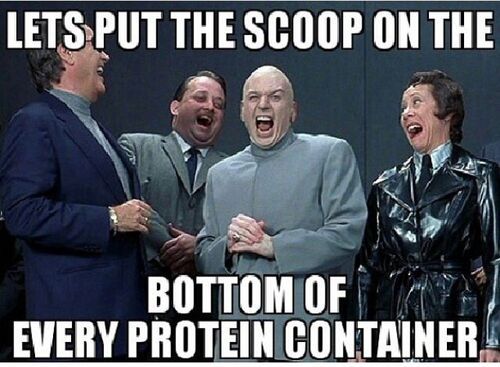When it comes to picking a protein powder, the sheer amount of options can be confusing and overwhelming.
Not only do you have several types of protein powders to choose from–whey, casein, egg, soy, and others–but in many cases each type has sub-types, like whey concentrate, whey isolate, whey hydrolysate, and so forth, as well as protein blends of two or more types.
Then there are the “little” things to take into account like the additional amino acids and digestive enzymes often included and, in many cases, all kinds of chemicals including sweeteners, flavorings, and all kinds of polysyllabic ingredients that we can’t even pronounce let alone understand.
You can ask the sales guy for help, but chances are it’ll just turn into this…
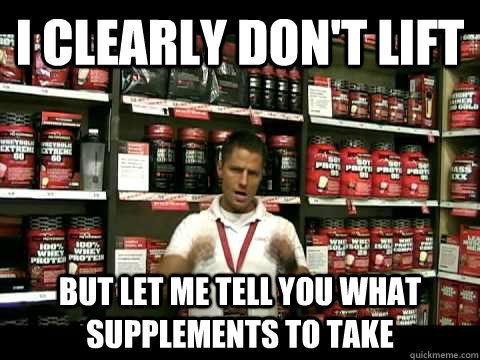
In the end, many people just pick the cheapest or best-tasting of the lot and move on with their lives. And that’s understandable.
In this article, however, I want to help you better understand the various types of protein powders out there and help you find what will be best for you.
Let’s get to it.
Table of Contents
+
Is Protein Powder Even Necessary?
To the average gymbro, this question is basically blasphemy. Is protein powder necessary? Is eating protein every 2 hours necessary? Is making gains necessary? DO YOU EVEN LIFT!?
Well, the reality is protein powder is not necessary for building muscle or losing fat and no specific type is. Eating enough protein every day is necessary, but there are plenty of high-quality food sources that will get the job done just as well as any protein powder, such as meat, seafood, dairy, eggs, legumes, and certain grains and seeds.
That said, protein powders do offer several advantages over food:
- They’re convenient and perfect for on-the-go eating.
- They’re nice for times when you would rather just drink a cup of tasty liquid instead of eating more food.
- They’re great for hitting daily protein targets without having to stuff yourself full of food every day.
- They can be very cost-efficient in terms of price per gram of protein and make eating healthy on a budget easier.
- They can be very low in carbohydrate and fat, which is nice for meal planning.
- They’re versatile for cooking purposes and can be incorporated into all kinds of dishes.
So, all things considered, while protein powders aren’t going to necessarily help you build muscle or lose fat faster, I think they’re worth buying and using.
What Are the Best Protein Powders?
The first thing to know is there really isn’t a single type of protein powder that is best for everyone. The key is finding what is best for you.
Some people do well with dairy derivatives and some don’t. Some want to stick with plant-based protein powders and others just want whatever will work best. Many want to limit their intake of artificial ingredients and aren’t sure what they should and shouldn’t avoid.
Well, let’s take an in-depth look at each of these things and more so you can narrow down your best choice for protein powder.
Whey Protein Powder
Whey protein powder is by far the most popular type of protein supplement out there. You get a lot of protein per dollar spent, it tastes good, and its amino acid profile is particularly suited to muscle building (more in that in a second).
What is it, though?
Whey is a semi-clear, liquid byproduct of cheese production. After curdling and straining milk, whey is left over.
It used to be thrown away as waste, but it was discovered that it’s a complete protein, and is abundant in an amino acid known as leucine. Leucine is an essential amino acid that plays a key role in initiating protein synthesis.
When the world of sports nutrition caught onto this research, the whey protein supplement was born.
Whey protein can be taken anytime, but it’s particularly effective as a post-workout source of protein because it’s rapidly digested, which causes a dramatic spike in amino acids in the blood (especially in leucine). This, in turn, stimulates more immediate muscle growth than slower-burning proteins.
So, whey is definitely one of the best protein powders available, and here’s the whey protein I personally use and recommend (and that I created!):
I should mention, however, that even if you’re not lactose intolerant, you can be allergic to the actual proteins found in cow’s milk. This is why some people don’t do well with highly refined forms of whey, such as isolate or hydrolysate, which have virtually all lactose removed.
If whey bothers your stomach, try a non-dairy alternative and you will be fine. My favorite non-diary protein is egg protein, but there are vegan options that work as well (we’ll get to them in a minute).
Casein Protein Powder
Casein protein is probably second in popularity behind whey, and it’s also a protein found in milk. The curds that form as milk coagulates are casein.
Casein protein is digested slower than whey, causing a smaller spike in amino acids in the blood, but a steadier release over the course of several hours.
There’s an ongoing debate about whether supplementing with whey is better than casein for building muscle or vice versa, but here’s what most reputable experts agree on:
- Due to its rapid digestion and abundance of leucine, a 30-40 gram serving of whey is probably your best choice for post-workout protein.
- Due to its slow release of amino acids, casein is a great all-around protein supplement. While it may or may not be as optimal as whey for post-workout protein (the jury is still out on this), there is a growing body of evidence indicating that, when supplementing with powders, a slow-burning protein is the best overall choice for building muscle.
- Casein is a good protein to have before you go to bed, which can help with muscle recovery.
My Favorite Casein Protein Powder
The best type of casein you can get is micellar casein. That’s because it’s produced in a way that preserves the small bundles of protein (micelles) that are responsible for its slow-digesting properties and often destroyed during traditional manufacturing processes.
That’s why when I set out to make my own casein powder (Casein+), I chose 100% micellar casein made from exceptionally high-quality milk from small, sustainable dairy farms in Ireland.
It’s also 100% naturally sweetened and flavored, and is the best-tasting all-natural micellar casein to boot.
Click here to learn more about my casein protein:
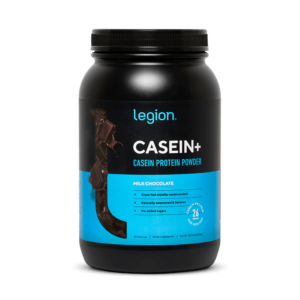
Egg Protein Powder
Many people don’t even know that you can buy egg protein in a powder form. You can, and it’s a great source of protein.
It has four primary benefits:
- It scores a 1.0-to-1.04 on the Protein Digestibility-Corrected Amino Acid Score (PDCAAS)—a scale used to measure how efficiently your body can absorb and use the amino acids in a protein source. A score of 1.0 is the highest possible (even though some proteins, like egg white, can technically score slightly above this), meaning egg white protein delivers all the essential amino acids in forms your body can readily use.
- Egg white protein is a complete protein, meaning it contains all nine essential amino acids your body can’t make on its own. That includes the three branched-chain amino acids (BCAAs)—leucine, isoleucine, and valine—that play a major role in the muscle-building process.
- Research shows that supplementation with egg white protein powder boosts muscle growth and strength when combined with strength training, and may also support fat loss and muscle retention while dieting.
- Egg white protein powder is low in calories, carbs, and fat, which makes it easy to fit into almost any macro setup.
The bottom line is egg protein is just a great all-around choice and it’s what I’ve used for a while now for all supplementation needs beyond pre- and post-workout (for which I use whey).
Here’s Legion’s naturally sweetened and flavored egg white protein powder made with antibiotic-free and hormone-free eggs and specially processed to dissolve quickly and easily in liquids:
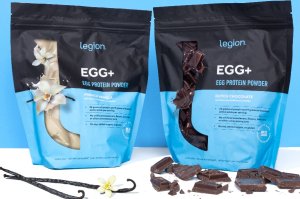
Soy Protein Powder
Soy protein is a mixed bag.
While research has shown it’s an all-round effective source of protein for building muscle, soy protein is a source of ongoing controversy, and especially for men.
According to some research, regular intake of soy foods has feminizing effects in men due to estrogen-like molecules found in soybeans called isoflavones.
For instance, a study conducted by Harvard University analyzed the semen of 99 men, and compared it against their soy and isoflavone intake during the 3 previous months. What they found is that both isoflavone and soy intake were associated with a reduction in sperm count. Men in the highest intake category of soy foods had, on average, 41 million sperm/ml less than men who did not eat soy foods.
On the other hand, a study conducted by the University of Guelph had 32 men eat low or high levels of isoflavones from soy protein for 57 days, and found that it didn’t affect semen quality. Furthermore, literature reviews like those conducted by Loma Linda University and St. Catherine University suggest that neither soy food nor isoflavones alter male hormone levels.
What gives, then?
Well, further research has indicated that there isn’t a simple answer just yet.
For instance, the effects can vary depending on the presence or absence of certain intestinal bacteria. These bacteria, which are present in 30-50% of people, metabolize an isoflavone in soy called daidzein into an estrogen-like hormone called equol.
In a study conducted by Peking University and published in 2011, researchers found that when equol-producing men ate high amounts of soy food for 3 days, their testosterone levels dropped and estrogen levels rose. These effects were not seen in women, regardless of equol production or lack thereof.
Related to this is a study conducted by Sungkyunkwan University, which found that in a high-estrogen environment, isoflavones suppressed estrogen production, and in a low-estrogen environment, they increased estrogen production.
Now, in the case of women, research has shown that it is less likely to negatively affect your hormones. There are other things to consider, however.
Research has shown that soy protein contains substances that inhibit the digestion of protein molecules and the absorption of other nutrients (antinutrients), as well as several known allergens.
While there is research that indicates soy might have special benefits for women such as reducing the risk of heart disease and breast cancer, other research casts doubt on these findings. And to the contrary, studies have shown that soy can even stimulate the growth of cancer cells.
Another issue that we have to deal with when we eat soy is the fact that the vast majority of soybeans grown in the States are genetically modified (91% according to government data).
The subject of genetically modified foods is incredibly heated, and too complex to fully address in this article (I will in a future article), but the safest bet at the moment is to avoid GM foods as much as possible until more research is done on the potential long-term health effects in humans.
Don’t let this scare you into completely avoiding soy protein, though. While women with breast cancer probably shouldn’t eat soy, there is no reason to fear a few servings of soy per week.
If I were to use soy protein powder, here’s the product I would choose:
If you want to supplement with a protein powder several times per day, and would like to include soy, then I recommend you alternate with another source.
Beef Protein Powder
Beef is a fantastic source of protein, but beef powder? That has to be disgusting, right?
Well, I’ve tried a few and yes, they were fucking horrid. The mixtures were incredibly thick and sticky and the taste of each was downright awful.
When I need to, I can have the palate of a Rottweiler and choke down just about anything, but I actually couldn’t even finish a scoop of beef protein powder in water (my standard liquid for testing taste and palatability).
Furthermore, I seriously question the quality of beef used to make these powders, and it’s generally a good idea to limit your intake of low-quality red meat.
Other Plant-Based Protein Powders
While soy is the most popular plant-based protein powder, there are others such as rice, hemp, and pea protein.
One of the common claims against these vegan protein powders is that they’re “incomplete” sources of protein. That is, some “experts” claim that such proteins are missing essential amino acids that your body needs, and thus must be combined in special ways to form “complete” proteins.
This myth and the faulty research that spawned it was thoroughly debunked by MIT years ago, but it still lingers. All protein found in vegetables is “complete.”
What is true, however, is that some forms of vegetable proteins are lower in certain amino acids than others, making certain sources better than others.
Three of the better, and more popular, types of vegan protein powders are rice, hemp, and pea protein. Here’s how they stack up:
- Rice protein is a great choice. It has a high biological value–around 80%, similar to beef–and tastes great (I think).
- Pea protein is equally good. Its biological value is about as good as rice’s, and has a high amount of leucine.
It’s also worth noting that using a combination of rice and pea protein works especially well, as their combined amino acid profile is similar to whey protein’s. That’s why this combination is often called the “vegan’s whey protein.”
- Hemp protein is the poorest choice of the three. While it has a great micronutrient profile, including omega-3 and omega-6 fatty acids, hemp is only about 30-50% protein by weight, whereas other options discussed in this article are 90-100%. Furthermore, the protein it does contain isn’t nearly as digestible as rice or pea protein, let alone animal products like whey, casein, or egg protein.
The reality is hemp should be viewed more as a whole food, and not a pure protein supplement.
Here’s my favorite plant-based protein powder:
“Weight Gainer” Supplements
While most people can maximize muscle growth by eating moderate amounts of food every day, there are the “hardgainer” types that have to eat surprisingly large amounts to build muscle and strength.
For example, I’ve worked with a lot of guys weighing in the 160s and 170s that had to eat upwards of 4,000+ calories per day just to gain 0.5 to 1 pound per week. That might sound like fun to you, but trust me, eating that much food every day becomes a downright chore.
What to do, then? Enter the weight gainer supplement, which is much more than a protein powder–it’s a meal replacement that can range from 500 to nearly 2,000 calories per serving (when mixed with milk).
While that sounds great to the guy that can’t stomach the idea of eating yet another plate of food to hit his daily macronutrient targets, I’m not a fan of weight gainers because they’re really damn expensive per serving and full of junk carbs (usually simple sugars like dextrose that have little nutritional value beyond supplying the body with carbohydrate).
I much prefer eating real food, and just stick to calorie-dense foods like…
- Red meat
- Grains like brown rice and quinoa
- Oils like coconut oil and olive oil
- Whole-fat dairy
- Multi-grain pasta and bread
- Almonds and almond butter
- Low-fiber fruits like bananas, melons, avocado, grapes, and citrus fruits
- White and sweet potatoes
If you’re having trouble eating enough every day, focus on these types of foods in your meal planning and you should have no trouble reaching your daily caloric needs without having to resort to weight gainers.
What About All the Artificial Junk in Many Protein Powders?
Before you buy a protein powder, it’s a good idea to check out the ingredients list because you’ll often find it contains a lot more than just protein.
While I’m not an “artificial alarmist,” here are my thoughts on the chemicals included in many protein powders.
Artificial Sweeteners
While artificial sweeteners may not be as dangerous as some people claim, studies suggest that regular consumption of artificial sweeteners may indeed be harmful to our health, and that more research is needed.
Personally I keep my intake of artificial sweeteners as low as possible and eat them very infrequently. I choose products that are naturally sweetened instead and use stevia as my go-to zero-calorie sweetener.
Now, in terms of protein powders and supplements, you have a handful of options for naturally sweetened protein powders but for the longest time were basically shit-out-of-luck with any other type of powdered supplement like pre-workout drinks, post-workout drinks, and the rest.
Well, I decided to do something about that and have created my own line of 100% naturally sweetened workout supplements. The name of the company is Legion, and my products aren’t just naturally sweetened…
- There are no artificial food dyes or other potentially harmful chemicals.
- There are no proprietary blends–you get to see exactly what you’re buying.
- There are no unnecessary filler ingredients used to pad the labels and make you think you’re getting a lot for your money.
- Every ingredient and backed by sound scientific research that you can review.
- Every ingredient is included at clinically effective dosages, which means dosages pulled directly from scientific studies showing benefits.
In short, I’m just making the supplements I’ve always wanted: clean, honest, and effective. And fortunately, I’m not alone–Legion has taken off and can barely keep stuff in stock.
Artificial Flavoring
Unlike artificial sweeteners, there is no scientific evidence that I know of that indicates that artificial flavoring may be harmful to our health.
I’ll take a naturally flavored product over an artificially flavored one, but I don’t take special measures to avoid artificial flavors like I do artificial sweeteners.
Other Chemicals Often Found in Protein Powders
As a general rule, limiting your intake of processed foods is a good idea, and I think the same goes for chemicals and other artificial ingredients. They’re not hard to avoid and we may be happy we did in a few decades when we better understand how they affect our bodies.
Well, check out the labels of many mainstream protein powders and you’ll see all kinds of junk like MSG (under one of its “pseudonyms“, preservatives, chemicals to improve taste and mouthfeel, among others.
I’ve always avoided these types of protein powders and generally like to see as short of an ingredients list as possible and like to know what each ingredient is and why it’s there.
How to Find the Best Protein Powder For You
As you can see, finding the best protein powder for you means trial and error. What I recommend is you try several of the options given in this article and see which your body does best with.
What works best for me is whey protein before and after my workouts and casein protein for all other supplementation needs. With a bit of experimentation, you can find what works best for you as well.
Oh and just to warn you…the scooper is never on top…
What are your thoughts on the best protein powder? Have anything else to share? Let me know in the comments below!
Scientific References +
- Lennerz, B. S., Alsop, D. C., Holsen, L. M., Stern, E., Rojas, R., Ebbeling, C. B., Goldstein, J. M., & Ludwig, D. S. (2013). Effects of dietary glycemic index on brain regions related to reward and craving in men. American Journal of Clinical Nutrition, 98(3), 641–647. https://doi.org/10.3945/ajcn.113.064113
- Suez, J., Korem, T., Zeevi, D., Zilberman-Schapira, G., Thaiss, C. A., Maza, O., Israeli, D., Zmora, N., Gilad, S., Weinberger, A., Kuperman, Y., Harmelin, A., Kolodkin-Gal, I., Shapiro, H., Halpern, Z., Segal, E., & Elinav, E. (2014). Artificial sweeteners induce glucose intolerance by altering the gut microbiota. Nature, 514(7521), 181–186. https://doi.org/10.1038/nature13793
- Abou-Donia, M. B., El-Masry, E. M., Abdel-Rahman, A. A., McLendon, R. E., & Schiffman, S. S. (2008). Splenda alters gut microflora and increases intestinal P-glycoprotein and cytochrome P-450 in male rats. Journal of Toxicology and Environmental Health - Part A: Current Issues, 71(21), 1415–1429. https://doi.org/10.1080/15287390802328630
- Qin, X. (2011). What made Canada become a country with the highest incidence of inflammatory bowel disease: Could sucralose be the culprit? In Canadian Journal of Gastroenterology (Vol. 25, Issue 9, p. 511). Pulsus Group Inc. https://doi.org/10.1155/2011/451036
- Schernhammer, E. S., Bertrand, K. A., Birmann, B. M., Sampson, L., Willett, W. C., & Feskanich, D. (2012). Consumption of artificial sweetener- and sugar-containing soda and risk of lymphoma and leukemia in men and women. American Journal of Clinical Nutrition, 96(6), 1419–1428. https://doi.org/10.3945/ajcn.111.030833
- Fowler, S. P., Williams, K., Resendez, R. G., Hunt, K. J., Hazuda, H. P., & Stern, M. P. (2008). Fueling the obesity epidemic? Artificially sweetened beverage use and long-term weight gain. Obesity, 16(8), 1894–1900. https://doi.org/10.1038/oby.2008.284
- Sylvetsky, A., Rother, K. I., & Brown, R. (2011). Artificial sweetener use among children: Epidemiology, recommendations, metabolic outcomes, and future directions. In Pediatric Clinics of North America (Vol. 58, Issue 6, pp. 1467–1480). Pediatr Clin North Am. https://doi.org/10.1016/j.pcl.2011.09.007
- Yang, Q. (2010). Gain weight by “going diet?” Artificial sweeteners and the neurobiology of sugar cravings: Neuroscience 2010. In Yale Journal of Biology and Medicine (Vol. 83, Issue 2, pp. 101–108). Yale Journal of Biology and Medicine. /pmc/articles/PMC2892765/
- House, J. D., Neufeld, J., & Leson, G. (2010). Evaluating the quality of protein from hemp seed (Cannabis sativa L.) products through the use of the protein digestibility-corrected amino acid score method. Journal of Agricultural and Food Chemistry, 58(22), 11801–11807. https://doi.org/10.1021/jf102636b
- Mariotti, F., Pueyo, M. E., Tomé, D., Bérot, S., Benamouzig, R., & Mahé, S. (2001). The influence of the albumin fraction on the bioavailability and postprandial utilization of pea protein given selectively to humans. Journal of Nutrition, 131(6), 1706–1713. https://doi.org/10.1093/jn/131.6.1706
- Young, V. R., & Pellett, P. L. (1994). Plant proteins in relation to human protein and amino acid nutrition. American Journal of Clinical Nutrition, 59(5 SUPPL.), 1203S-1212S. https://doi.org/10.1093/ajcn/59.5.1203S
- De Lemos, M. L. (2001). Effects of soy phytoestrogens genistein and daidzein on breast cancer growth. Annals of Pharmacotherapy, 35(9), 1118–1121. https://doi.org/10.1345/aph.10257
- Trock, B. J., Leena, H. C., & Clarke, R. (2006). Meta-analysis of soy intake and breast cancer risk. Journal of the National Cancer Institute, 98(7), 459–471. https://doi.org/10.1093/jnci/djj102
- Anderson, J. W., Johnstone, B. M., & Cook-Newell, M. E. (1995). Meta-Analysis of the Effects of Soy Protein Intake on Serum Lipids. New England Journal of Medicine, 333(5), 276–282. https://doi.org/10.1056/nejm199508033330502
- Brandon, D. L., & Friedman, M. (2002). Immunoassays of soy proteins. Journal of Agricultural and Food Chemistry, 50(22), 6635–6642. https://doi.org/10.1021/jf020186g
- Hisayasu, S., Orimo, H., Migita, S., Ikeda, Y., Satoh, K., Shinjo, S., Hirai, Y., & Yoshino, Y. (1992). Soybean protein isolate and soybean lectin inhibit iron absorption in rats. Journal of Nutrition, 122(5), 1190–1196. https://doi.org/10.1093/jn/122.5.1190
- Hwang, C. S., Kwak, H. S., Lim, H. J., Lee, S. H., Kang, Y. S., Choe, T. B., Hur, H. G., & Han, K. O. (2006). Isoflavone metabolites and their in vitro dual functions: They can act as an estrogenic agonist or antagonist depending on the estrogen concentration. Journal of Steroid Biochemistry and Molecular Biology, 101(4–5), 246–253. https://doi.org/10.1016/j.jsbmb.2006.06.020
- Liu, B., Qin, L., Liu, A., Shi, Y., & Wang, P. (n.d.). [Equol-producing phenotype and in relation to serum sex hormones among healthy adults in Beijing] - PubMed. Retrieved May 31, 2021, from https://pubmed.ncbi.nlm.nih.gov/22279666/
- Frankenfeld, C. L., Atkinson, C., Thomas, W. K., Gonzalez, A., Jokela, T., Wähälä, K., Schwartz, S. M., Li, S. S., & Lampe, J. W. (2005). High concordance of daidzein-metabolizing phenotypes in individuals measured 1 to 3 years apart. British Journal of Nutrition, 94(6), 873–876. https://doi.org/10.1079/bjn20051565
- Hamilton-Reeves, J. M., Vazquez, G., Duval, S. J., Phipps, W. R., Kurzer, M. S., & Messina, M. J. (2010). Clinical studies show no effects of soy protein or isoflavones on reproductive hormones in men: Results of a meta-analysis. Fertility and Sterility, 94(3), 997–1007. https://doi.org/10.1016/j.fertnstert.2009.04.038
- Messina, M. (2010). Soybean isoflavone exposure does not have feminizing effects on men: A critical examination of the clinical evidence. Fertility and Sterility, 93(7), 2095–2104. https://doi.org/10.1016/j.fertnstert.2010.03.002
- Beaton, L. K., McVeigh, B. L., Dillingham, B. L., Lampe, J. W., & Duncan, A. M. (2010). Soy protein isolates of varying isoflavone content do not adversely affect semen quality in healthy young men. Fertility and Sterility, 94(5), 1717–1722. https://doi.org/10.1016/j.fertnstert.2009.08.055
- Chavarro, J. E., Toth, T. L., Sadio, S. M., & Hauser, R. (2008). Soy food and isoflavone intake in relation to semen quality parameters among men from an infertility clinic. Human Reproduction, 23(11), 2584–2590. https://doi.org/10.1093/humrep/den243
- Tang, J. E., Moore, D. R., Kujbida, G. W., Tarnopolsky, M. A., & Phillips, S. M. (2009). Ingestion of whey hydrolysate, casein, or soy protein isolate: Effects on mixed muscle protein synthesis at rest and following resistance exercise in young men. Journal of Applied Physiology, 107(3), 987–992. https://doi.org/10.1152/japplphysiol.00076.2009
- Bilsborough, S., & Mann, N. (2006). A review of issues of dietary protein intake in humans. In International Journal of Sport Nutrition and Exercise Metabolism (Vol. 16, Issue 2, pp. 129–152). Human Kinetics Publishers Inc. https://doi.org/10.1123/ijsnem.16.2.129
- Norton, L. E., Wilson, G. J., Layman, D. K., Moulton, C. J., & Garlick, P. J. (2012). Leucine content of dietary proteins is a determinant of postprandial skeletal muscle protein synthesis in adult rats. Nutrition and Metabolism, 9(1). https://doi.org/10.1186/1743-7075-9-67
- Res, P. T., Groen, B., Pennings, B., Beelen, M., Wallis, G. A., Gijsen, A. P., Senden, J. M. G., & Van Loon, L. J. C. (2012). Protein ingestion before sleep improves postexercise overnight recovery. Medicine and Science in Sports and Exercise, 44(8), 1560–1569. https://doi.org/10.1249/MSS.0b013e31824cc363
- Boirie, Y., Dangin, M., Gachon, P., Vasson, M. P., Maubois, J. L., & Beaufrère, B. (1997). Slow and fast dietary proteins differently modulate postprandial protein accretion. Proceedings of the National Academy of Sciences of the United States of America, 94(26), 14930–14935. https://doi.org/10.1073/pnas.94.26.14930
- West, D. W. D., Burd, N. A., Coffey, V. G., Baker, S. K., Burke, L. M., Hawley, J. A., Moore, D. R., Stellingwerff, T., & Phillips, S. M. (2011). Rapid aminoacidemia enhances myofibrillar protein synthesis and anabolic intramuscular signaling responses after resistance exercise. American Journal of Clinical Nutrition, 94(3), 795–803. https://doi.org/10.3945/ajcn.111.013722
- Tipton, K. D., Elliott, T. A., Cree, M. G., Wolf, S. E., Sanford, A. P., & Wolfe, R. R. (2004). Ingestion of casein and whey prosteins result in muscle anabolism after resistance exercise. Medicine and Science in Sports and Exercise, 36(12), 2073–2081. https://doi.org/10.1249/01.MSS.0000147582.99810.C5
- Crittenden, R. G., & Bennett, L. E. (2005). Cow’s milk allergy: A complex disorder. In Journal of the American College of Nutrition (Vol. 24, Issue 6 Suppl, pp. 582S-591S). J Am Coll Nutr. https://doi.org/10.1080/07315724.2005.10719507
- Dangin, M., Boirie, Y., Garcia-Rodenas, C., Gachon, P., Fauquant, J., Callier, P., Ballèvre, O., & Beaufrère, B. (2001). The digestion rate of protein is an independent regulating factor of postprandial protein retention. American Journal of Physiology - Endocrinology and Metabolism, 280(2 43-2). https://doi.org/10.1152/ajpendo.2001.280.2.e340
- Fujita, S., Dreyer, H. C., Drummond, M. J., Glynn, E. L., Cadenas, J. G., Yoshizawa, F., Volpi, E., & Rasmussen, B. B. (2007). Nutrient signalling in the regulation of human muscle protein synthesis. Journal of Physiology, 582(2), 813–823. https://doi.org/10.1113/jphysiol.2007.134593

